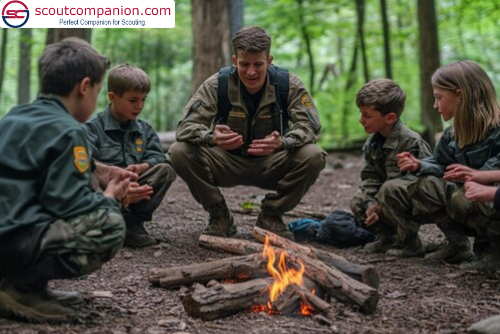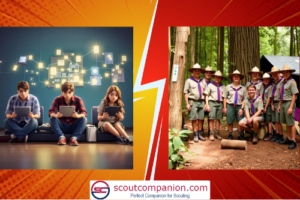Scouting is an outdoor experience that upskills young scouts with important life skills through challenging groups and fun activities with advanced personality growth. Skills like teamwork, problem-solving, communication, leadership, integrity, accountability, and character development are some important life skills that a scout can learn from a scouting experience. This article covers the following methods that scouting uses to teach kids important life skills.
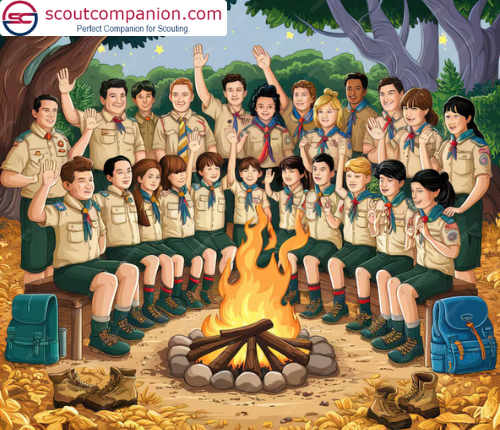
Table of Contents
Important 8 Life Skills
- The EDGE method
- Learning by doing
- Outdoor games
- Community involvement
- Patrol system
- Adult support
- Personal progression
- Nature
1. The EDGE method
The EDGE is a four-step teaching strategy used in scouting to teach life skills to young scouts. EDGE stands for Explain, Demonstrate, Guide, and Enable.

Explain: The scout troop’s leader or its trainer will explain the instructions about how something should be done. Explaining something will allow the scout leaders to improve their communication skills.
Demonstrate: The explanation is followed by an example to show the demo of doing the tasks or using some pieces of equipment. Experienced scout masters show the demo and also they get the young scouts involved in the demo so that they can practice. The main motto used in the demonstration is “Teach them; don’t tell them”. One hour of practical learning is better than a full day of theoretical learning.
Guide: Right after demonstrating the instructions the learners will practice doing the activities by following the guidance of the instructor or the trainer, and this is the part where the actual training begins.
Enable: When the scouts learn to use the equipment, they will be assigned some real-world challenges like shelter building, hiking, cooking meals, fire building, etc. At this part, the trainers also check whether the scouts are ready with all the equipment they need to face the upcoming challenges.
2. Learning by doing
Scouting activities always include outdoor activities and real-world actions like campsites, serving the community, and participating in nature preservation activities. As we know, one month of practical learning will beat the knowledge gained from one year of theoretical learning; it is essential to engage directly with real-world situations to truly understand and observe information effectively.
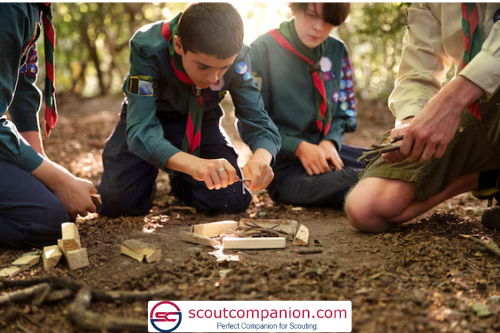
Hands-on experience not only deepens comprehension but also builds skills that theoretical study alone cannot provide. Learning by doing will also enhance the following skills:
- Improved understanding
- Motivation
- Critical thinking
- Adaptability
- Collaboration
3. Outdoor games
Outdoor games are an excellent choice for teaching life skills to young scouts in a fun and engaging way. The outdoor skills also help shape responsible, trustworthy, and community-oriented individuals who are capable of facing future challenges as adults.
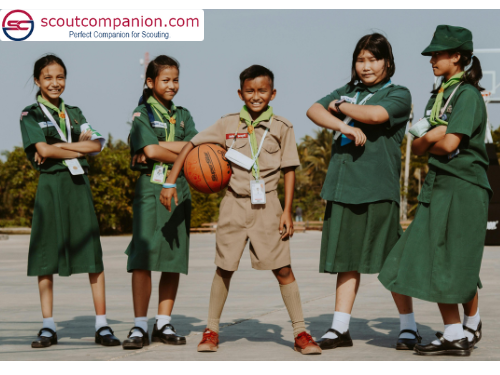
The main purpose of outdoor games is to connect with the natural environment to promote environmental awareness and love to preserve nature. Outdoor games will also make the kids physically fit and strong. Playing outdoor games requires teamwork and cooperation. This teaches the importance of collaboration to young scouts.
The scouts have to follow the rules and strategies in the outdoor games. From this, the kids will learn to be flexible and adaptive with others. Kids can also build long-lasting friendships with other participants by understanding and communicating with each other’s characters and adjusting to them. They can also build skills like sportsmanship, confidence, and strategic thinking.
4. Community Involvement
Community involvement refers to engaging as an individual or as a group in activities that will upgrade the society or the region that we live in. The main purpose of adding community involvement in scouting is:
- to bring a positive change in the community by serving
- promoting social connections with other participants
- contributing for the benefit of the society
- helping to build relationships with other community members.
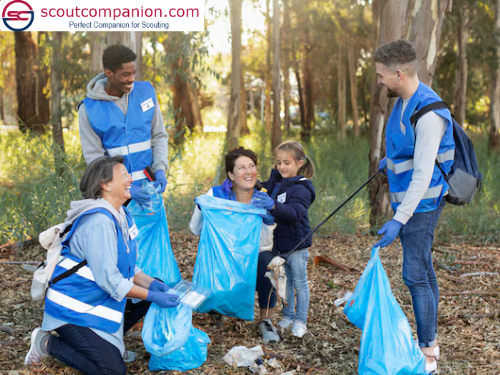
Community involvement also paves the way for two important skill development namely, character development and civic responsibility.
When the kids start to be involved in community activities, they learn about important values like empathy, responsibility, and respecting others.
Civic responsibility teaches the importance of providing back to their community in times of emergency and dangerous situations. By doing such services the kids will know about their roles and the changes they can make in the community.
5. Patrol System
The patrol system in scouting is nothing but a method of dividing and organizing scouts into manageable groups. Such groups are called patrols. Each patrol group will have six to eight scouts and operate independently even if they are a part of a large troop.
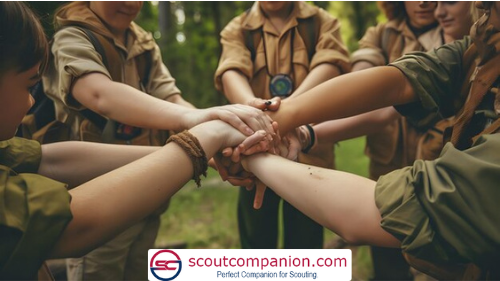
Since patrol is a group, the scouts need to work as a team. This will help the kids to learn about teamwork and cooperation. Each patrol will have its leaders. The kids who play the leader role will learn about leadership skills. Following are some of the skills the students can learn from the patrol system:
- Leadership
- Communication
- Teamwork
- Planning and organization
- Friendship and community
6. Adult support
Adult support in scouting refers to the guidance and resources provided by adult scout leaders to help young scouts develop their skills and upgrade their scouting experience. This support plays a vital role in providing a safe and supportive environment where the scouts can practice life skills.
The key aspects that adult support include:
- Mentorship: They share their knowledge and experience and serve as role models for young scouts as an inspiration.
- Safety and supervision: Adults supervise whether all the activities are done safely and also watch out for the scouts when doing events and serving communities.
- Conflict resolution: Whenever any conflicts arise among the scouts the adult leaders who are responsible for that particular scout will step in and help to resolve issues by teaching valuable lessons.
- Emotional support: Adult leaders always shine as a role models for young scouts. They also teach how to be a good citizen, motivate the scout patrol by speeches with confidence, and encourage the scouts to learn from their mistakes.
7. Personal progression
The term personal progression in scouting explains the individual development and growth of scouts through involvement in scouting activities.

We can learn about some of the personal progressions from below:
- Personal growth: The scouts as motivated to set personal goals, step out of their comfort zone, and face challenges which will increase their problem-solving ability along with building resilience.
- Skill development: Personal growth always comes with skill development. Even if the activities are team-based, each scout individual will get the ability to improve their skills.
- Achievements and badges: The young scouts are honored with badges and certificates for their achievements as a form of motivation. This act encourages them to achieve more in the scouting field.
8. Nature
In scouting, nature provides a peaceful and adventurous environment to practice and develop skills. Engaging with nature helps scouts to build survival techniques like hiking, navigation, finding food, etc.
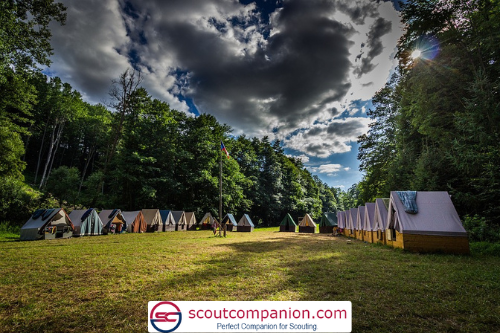
Young scouts are also taught the importance of the environment and ecological balance. This kind of teaching encourages the scouts to control deforestation and take effective steps in the conservation of forests like cleaning up the water resources, planting trees, and keeping the forests from getting polluted.
When getting trained in nature the scouts breathe fresh air and also they get physically fit. Connecting with nature imprints in the hearts of the young scouts and develops a life-long love for nature.
Conclusion:
In conclusion, scouting serves as a valuable platform for teaching kids essential life skills that are useful for them beyond the campsite. Through practical experiences, teamwork, and leadership opportunities, scouts develop critical thinking, problem-solving abilities, and a sense of responsibility. They focus on outdoor activities while developing values such as respect, perseverance, and community service. They also build lasting friendships. At the end of the day, it’s all a fun-filled training campsite with achievement badges.
